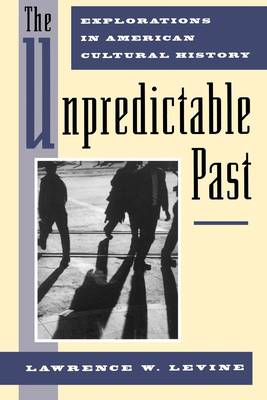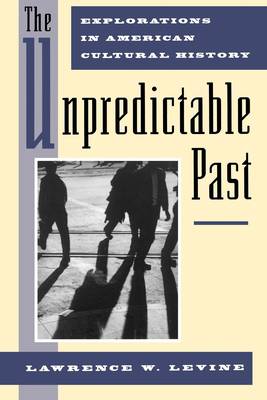
- Retrait gratuit dans votre magasin Club
- 7.000.000 titres dans notre catalogue
- Payer en toute sécurité
- Toujours un magasin près de chez vous
- Retrait gratuit dans votre magasin Club
- 7.000.0000 titres dans notre catalogue
- Payer en toute sécurité
- Toujours un magasin près de chez vous
The Unpredictable Past
Explorations in American Cultural History
Lawrence W Levine
Livre broché | Anglais
74,45 €
+ 148 points
Description
"The future is certain," according to an old Soviet joke, "it is only the past that is unpredictable." But it is not solely in totalitarian societies that the past is contested terrain. Disagreements about the meaning and significance of past events and people have been part of the landscape in our own society from its inception. To the historian, therefore, the unpredictability of the past is no laughing matter. Indeed, so protracted have historical disputes become in recent years that there has been a growing conviction among many that the venerable craft of history is in a state of crisis.
In this brilliant new collection of essays, Lawrence W. Levine, one of our premier writers of history and President-Elect of the Organization of American Historians, offers an incisive response to the controversy which rages in the academy today. This debate among historians does not concern, as one might think, conflicting interpretations of the past, but rather concentrates upon which past events, peoples, and cultures are significant enough to deserve our attention. Taking issue with those who desire "synthesis" above all else, Levine's book constitutes a passionate call for inclusion, a history that extends the traditional focus on the centers of political, economic, and social power to embrace the panoply of ethnic, racial, regional, occupational, class, and gender groups that have been ignored or distorted in the past, and subject areas--like folk and popular culture--that have been by-passed or denigrated as trivial. The fourteen essays included here seek not to erect new fences and shut more doors but to expand our knowledge, supplement our approaches, and broaden our historical vision.
The Unpredictable Past offers eloquent discussions of American history and historiography at large, African-American culture, and, perhaps most fascinating, the times of the Great Depression during which film, radio, photography, and even the comic strip emerged as significant manifestations of a changing American popular culture. There are also trenchant examinations of folk songs and folktales, Marcus Garvey's role as a black leader in the 1920s, jazz and American culture, Hollywood's unique view of national government in Washington (especially as seen in the films of Frank Capra), even Shakespeare's role as the most popular playwright in nineteenth-century America. The immediacy of each essay is enhanced by the brief introductions that place each one not only in the context of Levine's career, but in that of American history as a whole.
Through the course of the book, Levine demonstrates how history, from generation to generation, is viewed through the prism of an ever-changing present and rather than distorting our vision, offers us new ways of seeing things, fresh insights not only into the past, but into the present and the future as well. The Unpredictable Past is a remarkably wide-ranging lens for viewing the richly textured history of America.
In this brilliant new collection of essays, Lawrence W. Levine, one of our premier writers of history and President-Elect of the Organization of American Historians, offers an incisive response to the controversy which rages in the academy today. This debate among historians does not concern, as one might think, conflicting interpretations of the past, but rather concentrates upon which past events, peoples, and cultures are significant enough to deserve our attention. Taking issue with those who desire "synthesis" above all else, Levine's book constitutes a passionate call for inclusion, a history that extends the traditional focus on the centers of political, economic, and social power to embrace the panoply of ethnic, racial, regional, occupational, class, and gender groups that have been ignored or distorted in the past, and subject areas--like folk and popular culture--that have been by-passed or denigrated as trivial. The fourteen essays included here seek not to erect new fences and shut more doors but to expand our knowledge, supplement our approaches, and broaden our historical vision.
The Unpredictable Past offers eloquent discussions of American history and historiography at large, African-American culture, and, perhaps most fascinating, the times of the Great Depression during which film, radio, photography, and even the comic strip emerged as significant manifestations of a changing American popular culture. There are also trenchant examinations of folk songs and folktales, Marcus Garvey's role as a black leader in the 1920s, jazz and American culture, Hollywood's unique view of national government in Washington (especially as seen in the films of Frank Capra), even Shakespeare's role as the most popular playwright in nineteenth-century America. The immediacy of each essay is enhanced by the brief introductions that place each one not only in the context of Levine's career, but in that of American history as a whole.
Through the course of the book, Levine demonstrates how history, from generation to generation, is viewed through the prism of an ever-changing present and rather than distorting our vision, offers us new ways of seeing things, fresh insights not only into the past, but into the present and the future as well. The Unpredictable Past is a remarkably wide-ranging lens for viewing the richly textured history of America.
Spécifications
Parties prenantes
- Auteur(s) :
- Editeur:
Contenu
- Nombre de pages :
- 384
- Langue:
- Anglais
Caractéristiques
- EAN:
- 9780195082975
- Date de parution :
- 03-06-93
- Format:
- Livre broché
- Format numérique:
- Trade paperback (VS)
- Dimensions :
- 155 mm x 233 mm
- Poids :
- 544 g

Les avis
Nous publions uniquement les avis qui respectent les conditions requises. Consultez nos conditions pour les avis.






